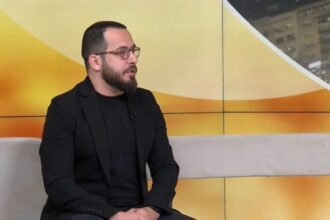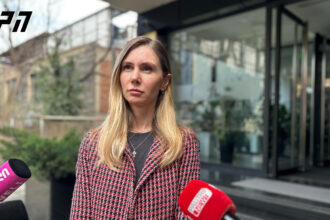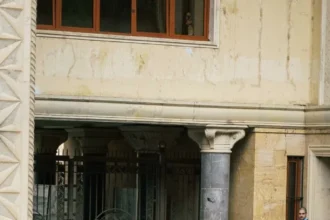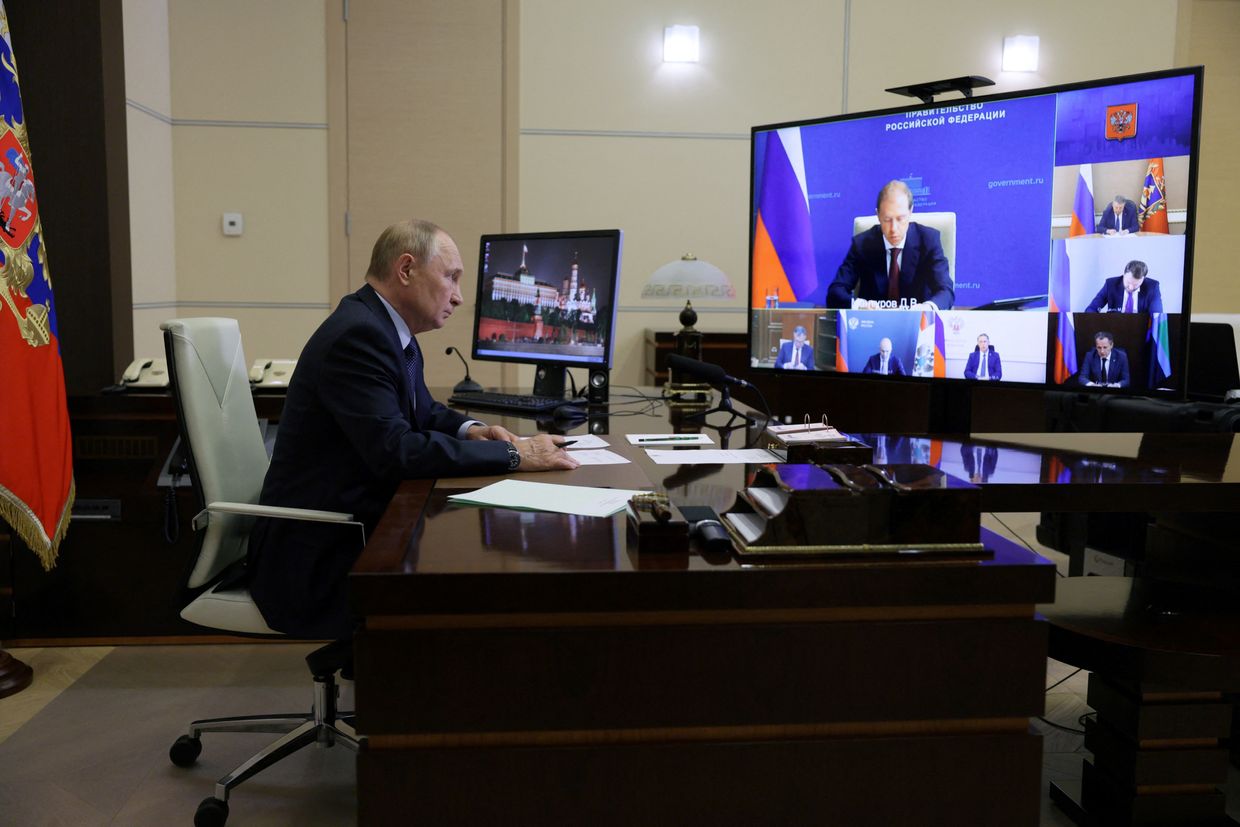A checkpoint with Ukrainian soldiers on the territory of Sudzha in Russia on August 16, 2024. (Kostiantyn Liberov/Libkos/Getty Images)
Yan, a local resident of Kursk who lives in the city, has been volunteering to help distribute clothing and bedding at a local drop off point since Ukraine launched its lightning incursion deep in Russia territory in early august.
Yan, whose full name was withheld to protect his privacy, told The Kyiv Independent that the number of people who visit the humanitarian aid points each week is on the rise. “Now that the cold weather has arrived, the need for warm clothing and insulated bedding is urgent, while food packages and hygiene products are still important,” he added.
Since two months, Ukrainian troops are in control of dozens settlements in Russia’s border region. Refugees continue to pour into the provincial capital of Kursk Oblast as fierce fighting continues in the west.
The Kursk offensive, which coincides with Ukraine’s increasing attacks on Moscow’s military assets deep within Russia, has shown Kyiv’s capability to bring about a brand new phase of war in the third full year of Russia’s brutal invasion. Some analysts warn that these audacious strategies, rather than being a thorn on the Kremlin’s side, will only fuel war support within the affected regions.
“The logic that if you try to target Russian society, and make life in Russia unbearable, it will turn Russians away from the Kremlin has been proven wrong. Tatyana Stanovaya is an analyst at Carnegie Russia Eurasia Center. She told the Kyiv Independent that the more threatening the situation, the more Russians will support the state.
On October 2, Russian forces captured Vuhledar, a city in Ukraine’s Donetsk Oblast. The loss of this strategic city, which was the scene of heavy fighting over the past two years, represents the slow and grinding advance of Russian forces into Ukraine’s east.
The incursion in Kursk was Kyiv’s attempt to redress this momentum, drawing Russian troops away from the east of the country and boosting morale throughout Ukraine. It was also intended to show Ukraine’s Western supporters that Russian “redlines” are not backed up by action, which could help Kyiv receive permission to attack Russian territory with Western made missiles.
“It has shown our partners what we are capable of.” “We have also shown (Russian President Vladimir Putin) that he does not have everything under his control,” Volodymyr Zelensky said in an interview with The New Yorker about the Kursk Incursion.
In recent weeks Ukraine has also intensified its strikes deep within Russian territory, destroying three munitions depots. Satellite images showed that the Oktyabrsky, Toropets, and Tikhoretsk storage facilities in Tver Oblast as well as the Krasnodar Krai depot were all but destroyed after a series drone strikes.
Stanovaya says that this tactic, while preventing Moscow from waging its war of aggression has a major side effect: the Russian population becomes accustomed to wars and wants them to continue until a victory is achieved. What victory means to them is rarely defined.
“One of most significant outcomes from the Kursk attack could be a strengthening of anti-Ukrainian, anti-Western sentiment. This in turn, could boost support for Putin, and prolong the conflict,” she wrote in an article on R.Politik.com, a website that provides analysis of Russian affairs.
In July, the Russian population voted at a record-high 58% in favor of a rapid end to the conflict. After the Kursk offensive this figure dropped to 49% according to the Russian pollster Levada Center.
This increase in war support comes at a time when Ukraine is reportedly looking for a way out of the war that has ravaged its country for nearly a thousand days. Zelensky presented a “victory plan” to U.S. president Joe Biden during a historic trip to the U.S. in late September.
“After 10 years, including 2 1/2 years of full-scale warfare, people are tired,” Oleksandr Merezhko, chair of Ukraine’s Foreign Affairs Committee, told The Kyiv Independent.
“Despite this, there is no choice but to continue fighting and persevere. It’s an attrition war, and we must outlast our enemy to win. It’s the only option,” Merezhko said.
In October, a further poll in Russia revealed that people wanted to end the conflict, but also recognized the need to continue fighting. The Chronicles and ExtremeScan projects conducted telephone interviews in Russia between July and September. They found that about half of respondents were in favor of a truce next year, even if the military goals for the country are not met.
Many have questioned whether polling is effective in Russia during wartime, where strict laws prevent any criticism of the “special military operation” that the Kremlin refers to.
The Kyiv Independent quoted Greg Yudin, professor of philosophy at the Moscow School of Social and Economic Sciences.
“Under authoritarian circumstances, it is explicitly prescribed to not have any preferences,” Yudin said in a paper that refuted figures about President Putin‘s popularity ratings published by Russian media outlet Important Stories.
Residents of the border areas who spoke anonymously to the Kyiv Independent demonstrated a deep anger towards Ukraine and a desire to settle the conflict militarily.
Many in Kursk, where tens and thousands of refugees have been arriving since the beginning August, believe that a long-lasting war is the only way for things to return to normal.
“People orient themselves around the views of the (government-controlled) media. The mood is to end this one, so we can go home,” said an attorney from Kursk Oblast. He recently moved to Leningrad Oblast because of cross-border shelling.
Yan said, “(People) blame Ukraine’s army and government, believing their actions have caused them to be internally displaced.” “They want to go home.” “They recognize that this is only possible if territories where they lived by military means are liberated,” he continued.
Alexey Gusev, an independent sociologist, said that the invasion of the Kursk Oblast as well as the raids on Belgorod Oblast made these regions the most “militaristic,” ultra-patriotic, and anti-Ukrainian.
The lawyer from Kursk, who spoke with the Kyiv Independent two years ago, left Russia out of fear he would be called up for military service. He did not see any reason for him to be forced to fight a war outside of Russia’s borders.
The lawyer, who returned to Russia after the Kursk invasion, now admits the incursion made it more difficult to avoid war.
“I thought my country did not need defending even though I had completed my military service and had promised to defend it. “It is still a part my country,” he said, despite the fact that it is only a small portion.
“It is hard to know what people think of peace negotiations. My opinion is that people want the Russian territory returned to Russia. “That is the minimum,” he said.
Merezhko stated that despite the discussions in Washington D.C., and the pivotal U.S. Presidential election on the horizon the time for negotiations could still be a long way off.
“I don’t think that Putin is prepared for any kind of negotiations at this time.” He said that he was not interested in peace because it would threaten his power.
“Peace through strength” can be applied to Putin if the pressure on him from the battlefield or sanctions is enough to stop his aggression, Merezhko said.
Stanovaya stated that Kyiv’s efforts to increase this pressure will only push us further away from peace prospects.
“The more dangerous things get, the more powerful the support for the Russian authorities will be.” “So it decreases Russia’s willingness to speak to Ukraine,” said she.
James Beardsworth, a broadcast journalist with the BBC World Service, focuses on Russia and Ukraine. James Beardsworth lived and reported for The Moscow Times in Moscow. His work has appeared in Al Jazeera Dozhd and GB News.
Read More @ kyivindependent.com




